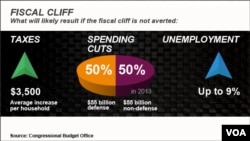WASHINGTON —
Looming automatic austerity measures in the United States, the so-called “fiscal cliff," could have a major impact on the economic vitality of towns and cities across the nation. Municipalities fear automatic tax hikes and spending cuts that would take effect January 1, as well as other measures Washington has been debating to avert the fiscal cliff.
Like many American towns, Dixon, Illinois, is still struggling to recover from the 2008 financial crisis and economic recession. Here, unemployment exceeds the national average. Residents are casting a nervous eye on Washington, where President Barack Obama and congressional leaders have been unable to agree on ways to curb America’s runaway national debt.
“I really wonder if they have thought things through,” said Dixon Mayor James Burke, who fears that an eventual deal may limit tax deductions for home owners, which could depress U.S. housing values. That, in turn, would constrain property taxes on which local governments across America rely.
“The big question is: what is going to happen to the housing industry? The housing industry has been the backbone of this economy in this country. I just wonder if the people in Washington really know what they are doing when they talk about that,” he said.
The threat of massive, across-the-board tax hikes and deep federal spending cuts has not spawned action in the nation’s capital. Congress' top Democrat and Republican acknowledge debt talks are deadlocked.
Washington was not always paralyzed by partisanship. In the 1990s, Former Democratic President Bill Clinton worked with a Republican Congress to balance the federal budget. A decade earlier, former Republican President Ronald Reagan worked with a Democratic Congress to reform Social Security, which provides income to retirees.
Reagan’s boyhood home still stands in Dixon, a national landmark and a source of local pride. The Republican icon would be horrified by today's gridlock in Washington, according to Reagan home overseer Ann Lewis.
“I think he [Reagan] would be very unhappy. Were he president today, there would have been negotiations going on long before this. Because he believed in bipartisan politics,” said Lewis.
Dixon is not alone in fearing fallout from America’s fiscal woes. Severe cutbacks in federal spending, known as sequestration, would impact many programs relied on by cities and towns across the nation, according to Michael Wallace of the National League of Cities.
“Cities have already been through a recession, and have done the hard work to overcome that. What they really need Congress to do right now is just to do no more harm. And failing to do anything on sequestration is certainly harm,” said Wallace.
The Dixon mayor is taking a wait-and-see approach. “The business community has a lot of confidence. Now, whether this fiscal cliff is going to bring all that to a screeching halt, I don't know,” said Burke.
Like many American towns, Dixon, Illinois, is still struggling to recover from the 2008 financial crisis and economic recession. Here, unemployment exceeds the national average. Residents are casting a nervous eye on Washington, where President Barack Obama and congressional leaders have been unable to agree on ways to curb America’s runaway national debt.
“I really wonder if they have thought things through,” said Dixon Mayor James Burke, who fears that an eventual deal may limit tax deductions for home owners, which could depress U.S. housing values. That, in turn, would constrain property taxes on which local governments across America rely.
“The big question is: what is going to happen to the housing industry? The housing industry has been the backbone of this economy in this country. I just wonder if the people in Washington really know what they are doing when they talk about that,” he said.
The threat of massive, across-the-board tax hikes and deep federal spending cuts has not spawned action in the nation’s capital. Congress' top Democrat and Republican acknowledge debt talks are deadlocked.
Washington was not always paralyzed by partisanship. In the 1990s, Former Democratic President Bill Clinton worked with a Republican Congress to balance the federal budget. A decade earlier, former Republican President Ronald Reagan worked with a Democratic Congress to reform Social Security, which provides income to retirees.
Reagan’s boyhood home still stands in Dixon, a national landmark and a source of local pride. The Republican icon would be horrified by today's gridlock in Washington, according to Reagan home overseer Ann Lewis.
“I think he [Reagan] would be very unhappy. Were he president today, there would have been negotiations going on long before this. Because he believed in bipartisan politics,” said Lewis.
Dixon is not alone in fearing fallout from America’s fiscal woes. Severe cutbacks in federal spending, known as sequestration, would impact many programs relied on by cities and towns across the nation, according to Michael Wallace of the National League of Cities.
“Cities have already been through a recession, and have done the hard work to overcome that. What they really need Congress to do right now is just to do no more harm. And failing to do anything on sequestration is certainly harm,” said Wallace.
The Dixon mayor is taking a wait-and-see approach. “The business community has a lot of confidence. Now, whether this fiscal cliff is going to bring all that to a screeching halt, I don't know,” said Burke.




